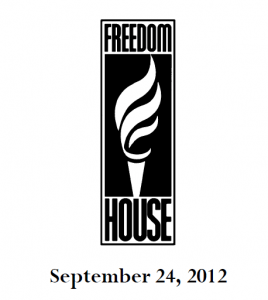 WASHINGTON – An annual assessment of global Internet freedom has at best mixed news. The 2012 survey, “Freedom on the Net 2012: A Global Assessment of Internet and Digital Media,” by Freedom House, finds repressive governments are becoming increasingly clever in their efforts to block messages and content.
WASHINGTON – An annual assessment of global Internet freedom has at best mixed news. The 2012 survey, “Freedom on the Net 2012: A Global Assessment of Internet and Digital Media,” by Freedom House, finds repressive governments are becoming increasingly clever in their efforts to block messages and content.
Full Report: FOTN 2012 FINAL.pdf
“Tactics used are becoming more sophisticated and more diverse,” Sanja Kelly, Project Director for the Freedom House survey, said at this morning’s briefing, and she pointed to a newly popular method that has spread widely among repressive regimes: defamation.
“We are seeing an increasing number of governments hiring literally an army of online bloggers,” she explained, “without of course revealing their connections to the government.”
According to Kelly, governments pay 50 cents per blog for agents to discredit dissidents. On a dissident blog, a government agent might claim the blogger is a criminal. “Yes, I heard that too,” another agent might write in agreement. And then other agents would write supporting – false – accusations of the dissident blogger.
“People just don’t know how to deal with it,” she said.
“I’m a glass three-quarters empty kind of guy,” said Bob Boorstin, Director of Public Policy for Google, a partner in the annual survey. “This report worries me in particular for users of the Internet.”
Boorstin added that the 2012 report documents how governments are becoming both more adept at censorship and more skilled at identifying and intimidating dissidents.
As a general rule, the higher the Internet use in a country, the freer it is. But there were exceptions: Bahrain and South Korea rank among countries with the highest Internet penetration, but both were rated poorly in the survey.
“I was surprised,” said Kelly of South Korea’s low score. When I asked her how Korea lost points, she said Seoul censors news and blogs about North Korea. And until recently Seoul required anyone wanting to blog or even comment in the Internet to register with his or her “equivalent of a Social Security number” before going on line. But Korea’s highest court just ruled that requirement is illegal, which Kelly said would raise South Korea’s ranking in next year’s survey.
Watch the entire briefing here: